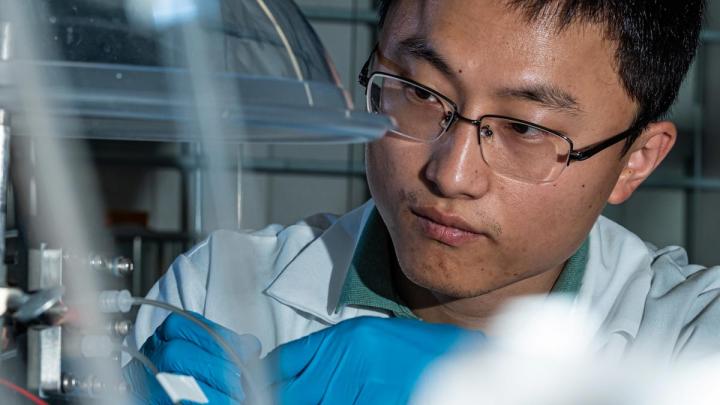NSF awards Haotian Wang $2 million to explore converting carbon dioxide into fuels

Credit: Jeff Fitlow/Rice University
HOUSTON – (Sept. 8, 2020) – Rice University engineer Haotian Wang has been awarded a four-year, $2 million collaborative grant by the Emerging Frontiers in Research and Innovation program of the National Science Foundation (NSF) to explore how waste carbon dioxide, the bane of Earth’s atmosphere, can be directly converted into pure liquid fuels.
The assistant professor and William Marsh Rice Trustee Chair of Chemical and Biomolecular Engineering has proposed the development of a modular electrochemical system that will provide “a sustainable, negative-carbon, low-waste and point-source manufacturing path preferable to traditional large-scale chemical process plants.”
Since joining the Rice faculty in 2019, Wang has developed a catalytic reactor that uses carbon dioxide as its feedstock. The NSF grant will address challenges that remain before the renewable strategy can be applied practically on a commercial scale.
Until now, the liquid products generated by electrochemical carbon dioxide reduction-reaction systems have been mixed with liquid electrolytes/soluble solutes, which requires energy- and cost-intensive separation processes to recover pure liquid fuel solutions. In addition, efficient electrochemical carbon dioxide reduction-reaction catalysts for target products are scarce. There is still a lack of new redox-active carbon dioxide carriers for effective electrochemical carbon dioxide capture from such point sources as flue gas.
“To address these challenges, our project is interdisciplinary,” Wang said. “We include experts in catalysts and electrolyzer design, polymer engineering, density functional theory simulations and carbon dioxide capture.”
Wang’s co-principal investigators are Rafael Verduzco, a Rice professor of chemical and biomolecular engineering; T. Alan Hatton, the Ralph Landau Professor and Director of the David H. Koch School of Chemical Engineering Practice at the Massachusetts Institute of Technology; and Yuanyue Liu, an assistant professor of mechanical engineering at the University of Texas at Austin.
“We intend to build an electrochemical modular system as a platform for a continuous conversion process of simulated flue gas to pure liquid fuels,” Wang said. “We address both materials-level design and device-level engineering.”
Experiments and simulations will be integrated in each of the project’s components, creating what Wang calls “a systematic feedback loop to accelerate design and understanding of carbon dioxide capture and conversion systems tailored for small-scale distributed chemical manufacturing.”
“We will work closely with Professor Wang and other collaborators to develop new polymer electrolytes, design more effective catalysts, improve carbon dioxide adsorbents and optimize the overall device for continuous generation of pure liquid fuels from carbon dioxide,” Verduzco said.
Earlier this year, Wang received a three-year, $240,000 research grant from the Houston-based Robert A. Welch Foundation for related research.
“Converting waste carbon dioxide into valuable chemicals and fuels using renewable electricity can distribute the way we produce chemical feedstocks, while making significant contributions to establish a potential anthropogenic carbon loop in the future,” he said.
###
This news release can be found online at https:/
Follow Rice News and Media Relations via Twitter @RiceUNews.
Related materials:
Rice reactor turns greenhouse gas into pure liquid fuel: http://news.
The Wang Group: https:/
Rice Department of Chemical and Biomolecular Engineering: https:/
George R. Brown School of Engineering: https:/
Image for download:
https:/
CAPTION: Haotian Wang. (Credit: Jeff Fitlow/Rice University)
Located on a 300-acre forested campus in Houston, Rice University is consistently ranked among the nation’s top 20 universities by U.S. News & World Report. Rice has highly respected schools of Architecture, Business, Continuing Studies, Engineering, Humanities, Music, Natural Sciences and Social Sciences and is home to the Baker Institute for Public Policy. With 3,962 undergraduates and 3,027 graduate students, Rice’s undergraduate student-to-faculty ratio is just under 6-to-1. Its residential college system builds close-knit communities and lifelong friendships, just one reason why Rice is ranked No. 1 for quality of life and No. 1 for lots of race/class interaction by the Princeton Review. Rice is also rated as a best value among private universities by Kiplinger’s Personal Finance.
Media Contact
Jeff Falk
[email protected]
713-348-6775
Original Source
https:/




